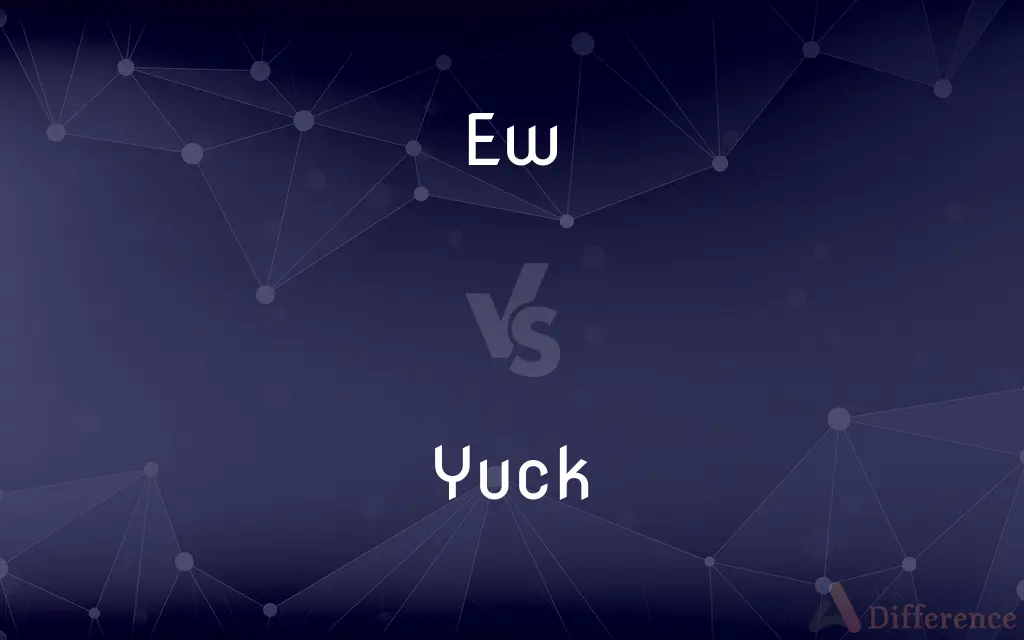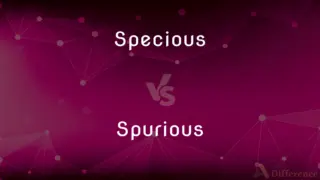Ew vs. Yuck — What's the Difference?
By Tayyaba Rehman & Maham Liaqat — Updated on April 17, 2024
"Ew" is a short exclamation indicating disgust, commonly used in informal settings, whereas "yuck" expresses a stronger level of revulsion, often in both informal and playful contexts.

Difference Between Ew and Yuck
Table of Contents
ADVERTISEMENT
Key Differences
Ew" is typically used to express a sudden reaction of disgust or distaste towards something unpleasant, often in a light, informal way. Whereas "yuck" can convey a similar sentiment but with an emphasis that may suggest greater intensity or a more visceral reaction.
In usage, "ew" might be employed in response to something visually unappealing or slightly offensive, like a bad smell or a small bug. On the other hand, "yuck" is often used for more intensely disagreeable experiences, such as tasting something extremely unpleasant.
The sound of "ew" is short and sharp, which can make it feel less severe and somewhat playful. In contrast, "yuck" involves a longer utterance that can give it a more emphatic, grossed-out tone.
"Ew" is often seen in casual conversation among friends or on social media as a quick, reactive comment. Whereas "yuck" might be used more broadly, including in children's books or cartoons, emphasizing a fun, expressive way of showing disgust.
Regarding the cultural context, "ew" has become popular in many English-speaking regions, particularly among younger demographics. Conversely, "yuck" might be recognized and used across wider age groups, maintaining a classic status in expressions of disgust.
ADVERTISEMENT
Comparison Chart
Intensity of Disgust
Mild to moderate
Moderate to high
Usual Context
Informal, light
Informal, can be playful
Length of Utterance
Short
Longer
Common Usage
Visual or slight offenses
Intensely disagreeable things
Popularity in Demographics
Younger people
Broader age range
Compare with Definitions
Ew
Informal reaction to visually unpleasant stimuli.
Ew, look at all that mud!
Yuck
Strong exclamation of disgust or revulsion.
Yuck, this milk has gone sour.
Ew
Often used among younger individuals in social contexts.
Ew, that meme is so gross.
Yuck
Common in children’s language to denote strong aversion.
Yuck, I hate broccoli.
Ew
Quick, instinctive expression of displeasure.
Ew, don’t touch that dirty towel.
Yuck
Used to express intense distaste towards food or taste.
Yuck, how can you eat that?
Ew
Exclamation expressing mild disgust.
Ew, I hate the smell of this perfume.
Yuck
Emphatic rejection of unpleasant sights, smells, or ideas.
Yuck, look at all that garbage.
Ew
Used to denote aversion in casual conversation.
Ew, I can’t believe he wore that.
Yuck
Playfully used to exaggerate reactions for effect.
Yuck, that joke was in bad taste.
Ew
Expression of disgust or nausea.
Ew! There’s a fly in my soup.
Ew! This peanut butter tastes disgusting!
Yuck
Used to express rejection or strong disgust.
Ew
A yew.
Yuck
Variant of yuk1.
Ew
Military action involving the use of electromagnetic energy to determine or exploit or reduce or prevent hostile use of the electromagnetic spectrum
Yuck
Uttered to indicate disgust usually toward an objectionable taste or odour.
Yuck! This peanut butter is disgusting!
Yuck
(uncountable) Something disgusting.
Yuck
The sound made by a whole-hearted laugh.
Yuck
To say "yuck"; to express disgust.
Yuck
To vomit or gag;
Yuck
(often followed by "up") To laugh or joke.
Yuck
To yank or grab.
Yuck
To itch.
Yuck
To scratch.
Yuck
An interjection expressing repugnance or distaste.
Yuck
A laugh; also, a joke or gag; - usually used in the plural, as, the skit got lots of yucks.
Common Curiosities
Can 'yuck' be used in formal communication?
Yuck is generally not suitable for formal contexts; it is predominantly used in informal or playful settings.
Is 'ew' a modern expression?
Yes, 'ew' has gained popularity in recent decades, particularly among younger speakers and in digital communication.
Are these terms interchangeable in everyday speech?
While they can sometimes be used interchangeably, 'yuck' is typically reserved for more intense expressions of disgust.
What contexts are appropriate for using 'ew'?
Ew is best used in casual, informal situations among peers or on social media to express mild disgust.
What is the origin of 'yuck'?
'Yuck' originates from the sound of disgust or revulsion, an onomatopoeic formation mimicking the reaction to something unpleasant.
Does 'yuck' imply a stronger emotion than 'ew'?
Yes, 'yuck' often implies a stronger, more visceral reaction of disgust compared to 'ew'.
How do children typically use 'yuck'?
Children often use 'yuck' to express strong distaste, especially in reaction to foods or messy situations.
Do males use 'ew' as much as females?
'Ew' is commonly used across genders, but it may be more prevalent among females, particularly in social media contexts.
What age group commonly uses 'ew'?
'Ew' is frequently used by teenagers and young adults, especially in informal settings.
Can 'ew' be considered rude?
While not inherently rude, 'ew' can be perceived as disrespectful if used inappropriately, especially in reactions to personal choices.
What are some synonyms for 'yuck'?
Synonyms for 'yuck' include 'gross', 'disgusting', and 'repulsive'.
Is 'ew' acceptable in professional emails or texts?
'Ew' is usually too casual for professional communications and might be seen as unprofessional.
Is 'yuck' found in English-speaking countries outside the U.S.?
Yes, 'yuck' is used in many English-speaking countries, though its popularity can vary by region.
Can 'ew' be used in literature?
'Ew' can be used in dialogue within literature to convey a character’s informal reaction to something distasteful.
How has the usage of 'ew' evolved over time?
The usage of 'ew' has expanded with the rise of social media and younger generations’ influence on language trends.
Share Your Discovery

Previous Comparison
Specious vs. Spurious
Next Comparison
Donators vs. DonorAuthor Spotlight
Written by
Tayyaba RehmanTayyaba Rehman is a distinguished writer, currently serving as a primary contributor to askdifference.com. As a researcher in semantics and etymology, Tayyaba's passion for the complexity of languages and their distinctions has found a perfect home on the platform. Tayyaba delves into the intricacies of language, distinguishing between commonly confused words and phrases, thereby providing clarity for readers worldwide.
Co-written by
Maham Liaqat













































